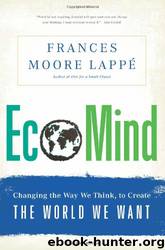EcoMind: Changing the Way We Think, to Create the World We Want by Frances Moore Lappe

Author:Frances Moore Lappe [Lappe, Frances Moore]
Language: eng
Format: epub
ISBN: 9781568586830
Publisher: Nation Books
Published: 2011-09-13T00:00:00+00:00
thought trap 7:
IT’S TOO LATE!
It’s too late! Human beings have so far overshot what
nature can handle that we’re beyond the point of no return.
Democracy has failed—it’s taking way too long to face the crisis.
And because big corporations hold so much power, real democracy,
answering to us and able to take decisive action, is a pipe dream.
“TRYING TO SAVE THE PLANET IS JUST A LOT OF NONSENSE . . . because we can’t do it,” says ninety-two-year-old Professor James Lovelock, known for his “Gaia hypothesis” that the biosphere is a single living organism.1 Ross Gelbspan, acclaimed author of Boiling Point, tells us that “we have failed to meet nature’s deadline” and warns, “The environmental establishment continues to peddle the notion that we can solve the climate problem. We can’t.” Even if humanity tomorrow were to reject oil and coal, “it would still be too late to avert major climate disruptions,” he argues. Sea level is rising twice as fast as predicted, and drought is already killing crops. Famine, disease, displacement—all are certain, he says.2
Much more often I hear, simply, “Yep, game’s over. We’re f—ked.”
To those declaring our species’ near-future demise, I find myself wanting to shout, Wait a minute!
Half the world is getting by right now on a daily sum equal to the price of a single American latte—or less. About 1 billion of us lack the food and water we need.3 In the Global North, millions are struggling and stressed as well. Even before the Great Recession, it was estimated that almost 60 percent of Americans will live in poverty for at least a year during their adult lives.4 In short, catastrophe is already the daily experience of huge numbers.
So here’s my question: Too late for what?
I agree with Gelbspan that it is too late to prevent massive change in the climate we humans have taken for granted for thousands of years. Erratic, extreme, and destructive weather is already with us. It is too late to prevent suffering. Terrible suffering is already with us.
But it is not too late for life.
Life loves life. Life strives to “create the conditions conducive to life,” says “biomimicry” champion Janine Benyus.5 That’s just what we do. In other words, the very essence of life, including the version we call human—creatures who yearn to make their mark in the world—isn’t changed by climate chaos. It is not too late to be ourselves. In fact, for our species, with its passion for shared action toward common ends, maybe now is the time to be alive.
When facing staggering setbacks—from the Black Death of the fourteenth century to world wars killing nearly 100 million people in the twentieth—most human beings don’t end up ruing life. What makes us miserable isn’t a big challenge. It’s feeling futile, alone, confused, discounted—in a word, powerless. By contrast, those confronting daunting obstacles, but joined with others in common purpose, have to me often seemed to be the most alive.
So it’s not too late to take in today’s explosion of learning about our own
Download
This site does not store any files on its server. We only index and link to content provided by other sites. Please contact the content providers to delete copyright contents if any and email us, we'll remove relevant links or contents immediately.
| Automotive | Engineering |
| Transportation |
Whiskies Galore by Ian Buxton(41993)
Introduction to Aircraft Design (Cambridge Aerospace Series) by John P. Fielding(33115)
Small Unmanned Fixed-wing Aircraft Design by Andrew J. Keane Andras Sobester James P. Scanlan & András Sóbester & James P. Scanlan(32789)
Craft Beer for the Homebrewer by Michael Agnew(18235)
Turbulence by E. J. Noyes(8040)
The Complete Stick Figure Physics Tutorials by Allen Sarah(7362)
The Thirst by Nesbo Jo(6930)
Kaplan MCAT General Chemistry Review by Kaplan(6926)
Bad Blood by John Carreyrou(6610)
Modelling of Convective Heat and Mass Transfer in Rotating Flows by Igor V. Shevchuk(6432)
Learning SQL by Alan Beaulieu(6280)
Weapons of Math Destruction by Cathy O'Neil(6264)
Man-made Catastrophes and Risk Information Concealment by Dmitry Chernov & Didier Sornette(6003)
Digital Minimalism by Cal Newport;(5749)
Life 3.0: Being Human in the Age of Artificial Intelligence by Tegmark Max(5545)
iGen by Jean M. Twenge(5408)
Secrets of Antigravity Propulsion: Tesla, UFOs, and Classified Aerospace Technology by Ph.D. Paul A. Laviolette(5364)
Design of Trajectory Optimization Approach for Space Maneuver Vehicle Skip Entry Problems by Runqi Chai & Al Savvaris & Antonios Tsourdos & Senchun Chai(5063)
Pale Blue Dot by Carl Sagan(4996)
